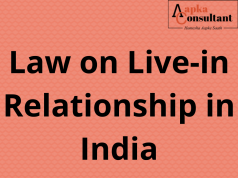The law and society go parallel to each other and the change in one always effect the other.Theindian society is opening their minds towards the changes happenings in the every next genration because of the modernization and globalization.In the same way the concept of Live in relationship has been emerged in the Indian society Live in relationship means when two people live together without doing any marriage ritual just to know whether they can survive with each other.
The society may consider it immoral but in the eye of law it has no harm.
Cohabitation or live in relationships have turned into a common pattern amongst people across the Western world. There are a multitude of reasons why a couple may want to live together. It may be because they want to evaluate their compatibility in a more practical way, or to establish financial security before officially tying the knot. Apart from that, it may be also due to legal constraints that would not allow them to marry – for example, if they belong to the same sex.
In another case just two years later, Supreme Court ruled that if an unmarried couple of opposite sexes live together for a prolonged period of time, they can be considered as man and wife. Also, their child, if any, would be legitimate.
In the cases prior to independence like A Dinohamy v Blahamy, the Privy Council laid down a broad rule postulating that, where a man and a woman are proved to have lived together as a man and wife, the law will presume, unless the contrary be clearly proved, that they were living together in consequence of a valid marriage and not in a state of concubine. After independence the first case that can be reviewed is Badri Prasad v Dy. Director of Consolidation wherein the Supreme Court recognized live-in relationship as valid marriage, putting a stop to questions raised by authorities on the 50 years of life in relationship of a couple.
In PayalKatara v. Superintendent NariNiketanKandriVihar Agra and Others the Allahabad High Court ruled out that “a lady of about 21 years of age being a major, has right to go anywhere and that anyone –man and woman even without getting married can live together if they wish”.
In Patel and others case the apex court observed that live- in –relation between two adult without formal marriage cannot be construed as an offence.
In Radhika v. State of M.P. the SC observed that a man and woman are involved in live in relationship for a long period, they will treat as a married couple and their child would be called legitimate.
In AbhijitBhikasethAutiv.State of Maharashtra and Others on 16.09.2009, the SC also observed that it is not necessary for woman to strictly establish the marriage to claim maintenance under sec. 125 of Cr.P.C..A woman living in relationship may also claim maintenance under Sec.125 CrPC.
The Maharashtra Government in Oct. 2008 approved a proposal suggesting a woman involved in such a relationship for a ‘reasonable period’ should get status of a wife.
The Malimath committee had also suggested that the word ‘wife ‘under Cr.P.C. be amended to include a ‘woman living with the man like his wife’ which means the woman would also be entitled to alimony.
In Lata Singh v State of UP &Anr. The Apex Court held that live-in relationship was permissible only between unmarried major persons of heterogeneous sex. If a spouse is married, the man could be guilty of adultery punishable under section 497 of the IPC. The same was relied on in S. Kushboo v Kanniammal&Anr. With the husband surviving, Rangammal cannot invoke presumption of live-in. thus the children became illegitimate and disqualified to inherit u/s 16 of the Hindu Marriage Act, 1955. This judgment is not prohibitive law for live-in kids. So, live-in could be ‘a dangerous thing’ between a wife and non-husband as it could lead to the crime of adultery, but never to ‘marriage’.
It’s better to have a live-in relationship rather than having a divorced life.This is common and quite rational line favoring live-in relations in the world. It should not be denied that our culture does need a legislature to regulate relationships which are likely to grow in number with changes in the ideology of people. The right time has come that efforts should be made to enact a law having clear provisions with regard to the time span required to give status to the relationship, registration and rights of parties and children born out of it. Laws should be made by the parliament, which should keep a check on the practice of evading bondages.










